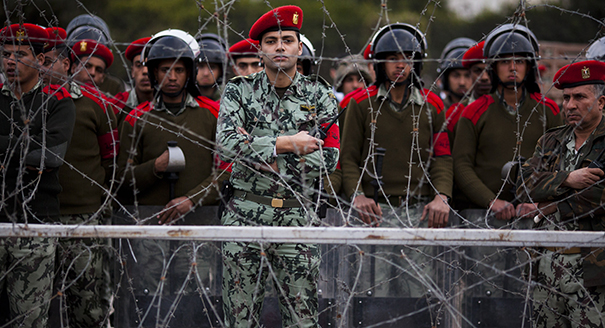Mustaqbal Misr has expanded its portfolio with remarkable speed, but a lack of transparency remains.
Yezid Sayigh
{
"authors": [
"Yezid Sayigh"
],
"type": "commentary",
"blog": "Diwan",
"centerAffiliationAll": "",
"centers": [
"Carnegie Endowment for International Peace",
"Malcolm H. Kerr Carnegie Middle East Center"
],
"collections": [
"Civil-Military Relations in Arab States"
],
"englishNewsletterAll": "",
"nonEnglishNewsletterAll": "",
"primaryCenter": "Malcolm H. Kerr Carnegie Middle East Center",
"programAffiliation": "",
"programs": [
"Middle East"
],
"projects": [],
"regions": [
"Egypt",
"North Africa"
],
"topics": [
"Political Reform"
]
}
Source: Getty
The military has no interlocutors with which to negotiate a transition toward broader participation in national decisions.
Official Egyptian responses to civil conflict and political transitions among countries since early 2019 have shown an instinctive preference to help a military strongman to power in Libya and preserve the overriding say of the armed forces in the governing arrangements of Sudan and Algeria.
However, a more thoughtful Egyptian approach would draw different conclusions with regard to the future role of Egypt’s armed forces in the country’s politics and government. Broader participation is needed in national decisionmaking, whether in the management of the economy and public finances, in supporting markets, or in social development. That means political transition. But if this is to happen in the foreseeable future, and peacefully, it can only be initiated by the armed forces themselves.
Behind the upbeat rhetoric coming out of Cairo, Western capitals, and financial institutions about Egypt’s prospects, lie deeply worrying social and economic realities. In April 2019, the World Bank estimated that 60 percent of Egyptians were “poor or vulnerable,” in part reflecting the sharp decline of financial security for the middle class. Improvements in macroeconomic indicators such as GDP growth rates and foreign currency reserves are reassuring. However, they also obscure the fact that the administration of President Abdel-Fattah al-Sisi has proven no more capable than its predecessors since the armed forces founded the republic in 1952 to resolve the problems of low productivity and domestic investment and parasitical business modes that have prevented Egypt from standing on its feet economically. To the contrary, Sisi’s emphasis on launching vanity megaprojects has generated significant dead capital and opportunity costs, while the external debt has reached all-time highs.
Egypt is not at a crisis point. But with a population expanding by 2 million people annually and evidence of deepening labor market distress and deterioration in the quality of employment, the country faces social and economic challenges at least as daunting as those that generated the popular movements that forced autocratic, military-backed presidents from office in Algeria and Sudan. Moreover, the decrepitude of the state’s civilian bureaucracy is such that, under instruction from Sisi, the armed forces have managed approximately one-quarter of all government-funded public works since 2014. They have also intervened in economic sectors as diverse as steel and cement production and gold prospecting, with the declared aims of stabilizing market prices and increasing state revenue.
For all their boasts of superior administrative and engineering skills, the armed forces are at least as incapable as government ministers and civilian technocrats in mobilizing greater domestic revenues sufficient to increase public consumption and expand exports. They may come to realize that the armed forces cannot make up indefinitely for the deficiencies of civilian state agencies in providing economic management and other public goods. At the very least, those in the senior officer corps without a vested interest in the military’s economic and commercial activities may conclude that the armed forces’ professional interests are better served by discontinuing their current role. These “army institutionalists,” may seek an exit.
This could set the stage for the military to initiate a peaceful transition. That should be good news, but it faces a serious hitch. When, for reasons of its own, the Brazilian military launched the abertura in 1974 that returned civilians to power a decade later and its Chilean counterpart upheld the electoral defeat of dictator Augusto Pinochet in 1988, they negotiated transition formulas with both political opposition parties and their own business allies. But the Sisi administration has eliminated or marginalized all potential interlocutors. Islamists, liberals, social democrats, and leftist and youth activists have been crushed or hounded, and the business sector is regime-friendly but lacks cohesion as a class ally. Its main figures are either in a relationship of parasitical dependence on the state for contracts or disquieted by military encroachment.
Even authoritarian regimes need to anchor their political power in social alliances, but for now the principal members of Egypt’s governing coalition remain too invested in pursuing their narrow interests and consolidating their share of power and public funds to appreciate the danger or consider a change in behavior. But while the Interior Ministry appears most entrenched and retrograde, the armed forces may be starting to grasp the need to prepare for an orderly withdrawal from an overtly political role.
The revised constitution of April 2019, which empowered the armed forces to “protect the constitution and democracy” and “preserve the pillars of the civil state,” clearly legitimizes future interventions along the lines of the July 2013 coup. By the same token, it may also have been designed to enable the armed forces to extricate themselves from the complex politics and institutional turf battles of governing Egypt, without relinquishing power altogether, abandoning the system they serve, or committing themselves to serving Sisi or future presidents unquestioningly.
This residual political role is what the Chilean armed forces sought in the revised constitution they crafted in 1980, and their Turkish counterparts secured before handing meaningful power back to a civilian government three years later. Perhaps this is too optimistic an interpretation in Egypt’s case. The risk is that, even if the armed forces fully realize the need and prevail upon the president and other governing coalition partners to negotiate a transition, it may be too late for it to be both peaceful and orderly.
Carnegie does not take institutional positions on public policy issues; the views represented herein are those of the author(s) and do not necessarily reflect the views of Carnegie, its staff, or its trustees.
Mustaqbal Misr has expanded its portfolio with remarkable speed, but a lack of transparency remains.

Yezid Sayigh
The burden of environmental degradation is felt not only through physical labor but also emotional and social loss.

Yasmine Zarhloule, Ella Williams
The country’s youthful protest movement is seeking economic improvement, social justice, and just a little hope.

Yasmine Zarhloule
The Moroccan-Algerian rivalry is playing itself out in ties with Burkina Faso, Niger, and Mali.

Yasmine Zarhloule
The president has blocked the emergence of new power centers within the Egyptian regime.

Yezid Sayigh